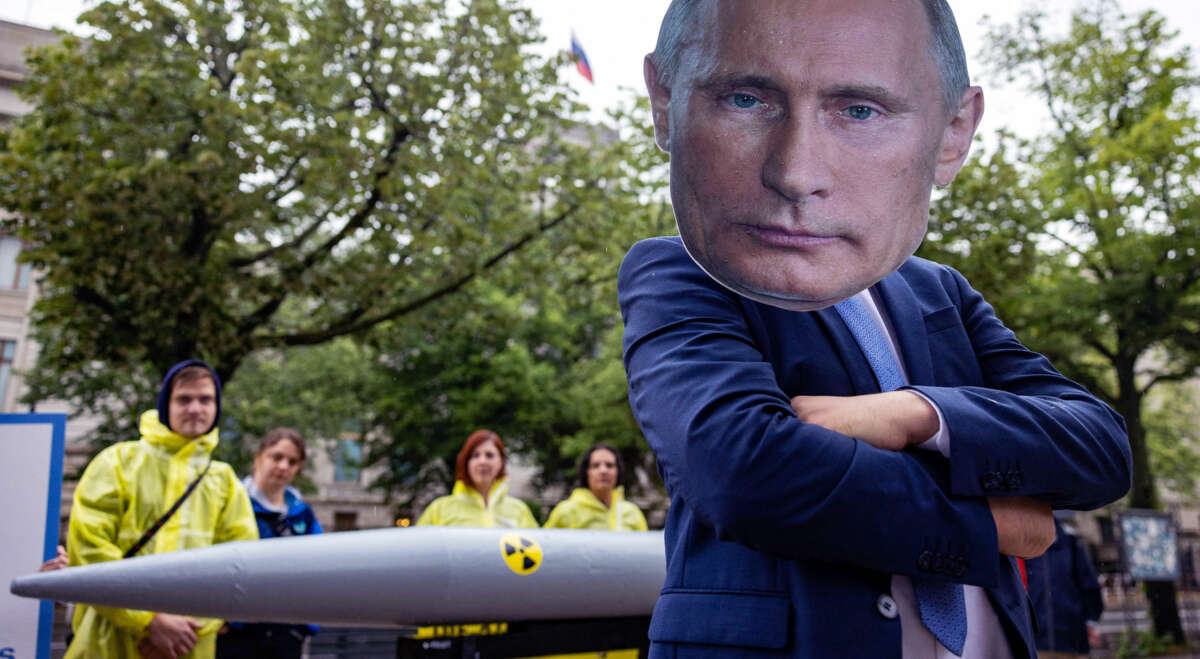Support justice-driven, accurate and transparent news — make a quick donation to Truthout today!
Russia has begun transferring tactical, or short-range, nuclear weapons to Belarus, prompting President Joe Biden to call the move “absolutely irresponsible” earlier this month. He’s not wrong. It is irresponsible to disburse nuclear weapons to other countries, increasing the risk that those weapons could be used by accident, miscalculation, or deliberately, especially with an active war nearby. The only problem is that the United States has been doing the same thing — sharing its nuclear weapons with its European allies — for decades. If Russia is being irresponsible, surely, we are too?
Russian Deputy Foreign Minister Sergei Ryabkov told reporters more recently that Russia will not disclose the number of nuclear warheads it is stationing in Belarus, or inform the U.S. of tests of its nuclear-capable Poseidon torpedo. “For decades the United States has kept its tactical nuclear weapons on the territory of a number of European countries, and it never gives exact numbers,” Ryabkov said.
President Biden speaking about the Russian transfer of nuclear weapons to Belarus reveals the U.S.’s own hypocrisy on the issue of nuclear sharing: The U.S. has stationed nuclear weapons in Europe since the 1950s. At one point, we had around 8,000 nuclear warheads spread across several countries. Some of those countries, like Greece, ended the arrangement. Others, including Belgium, Italy, Germany, Netherlands and Türkiye, maintain arsenals to this day, far smaller than what was once stockpiled there, but still enough to turn Europe into a powder keg.
Moreover, rather than being “defensive” weapons, as they are usually described, these are first-use weapons, according to the recently deceased U.S. antiwar hero and anti-nuclear campaigner Daniel Ellsberg. They do not make these countries any safer and only increase the risk that nuclear war will start in Europe.
Why would President Biden expect that Russia should refrain from transferring nuclear weapons to its allies when the U.S. is doing just that? What is needed now is for the U.S. to engage in serious dialogue with Russia on ending all nuclear-sharing arrangements. Just as, during the Cuban missile crisis, Soviet leader Nikita Khrushchev proceeded to remove nuclear warheads from Cuba when President John F. Kennedy promised to remove U.S. warheads from Turkey, Presidents Biden and Putin should come to an agreement that both U.S. and Russian nuclear sharing must end.
Ending nuclear sharing would not only make the world safer, it would also remove one of the current criticisms of the Nuclear Non-Proliferation Treaty (NPT), which is in a precarious condition. This historic treaty has been in force since 1970, and while it is one of the largest international treaties and can be credited with accomplishments regarding two of its pillars, so-called peaceful nuclear energy and nonproliferation, its prospects for enduring are dim.
The last two NPT review conferences, held in 2015 and 2022, have failed to produce outcome documents agreed upon by all parties, putting the future of the treaty in jeopardy. While many of the current debates about the treaty revolve around the lack of progress by the nuclear weapons-possessing states on nuclear disarmament, (the third pillar of the treaty), nuclear sharing is another point of contention. What does it mean for non-nuclear-weapons states to host the nuclear weapons of other states on their territory under the NPT?
Moreover, short-range weapons like those that Russia is transferring to Belarus do not fall under the terms of the New START treaty, which limits the countries’ strategic nuclear arsenals. President Putin has suspended Russia’s participation in the treaty — the last remaining U.S.-Russia arms control agreement — but both sides have pledged to continue to respect its limits. There’s also no treaty covering nuclear-powered autonomous torpedoes, such as Poseidon. An agreement to end nuclear hosting in Europe could be the beginning of a wider conversation between the U.S. and Russia on all of these related concerns.
It is time for the U.S. to admit that nuclear sharing is wrong and to negotiate with Russia to end all such arrangements. Reducing the risk of nuclear war, at a time when this existential risk is higher than it has been in decades, should be at the top of both countries’ agendas. Presidents Biden and Putin shouldn’t wait for their own missile crisis to do the right thing.
A terrifying moment. We appeal for your support.
In the last weeks, we have witnessed an authoritarian assault on communities in Minnesota and across the nation.
The need for truthful, grassroots reporting is urgent at this cataclysmic historical moment. Yet, Trump-aligned billionaires and other allies have taken over many legacy media outlets — the culmination of a decades-long campaign to place control of the narrative into the hands of the political right.
We refuse to let Trump’s blatant propaganda machine go unchecked. Untethered to corporate ownership or advertisers, Truthout remains fearless in our reporting and our determination to use journalism as a tool for justice.
But we need your help just to fund our basic expenses. Over 80 percent of Truthout’s funding comes from small individual donations from our community of readers, and over a third of our total budget is supported by recurring monthly donors.
Truthout has launched a fundraiser to add 500 new monthly donors in the next 9 days. Whether you can make a small monthly donation or a larger one-time gift, Truthout only works with your support.
